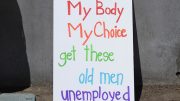By: Lisa Keen*/Keen News Service—
In a stunning double victory, the U.S. Supreme Court today issued decisions that strike down both the Defense of Marriage Act and Proposition 8.
The DOMA decision, a 5 to 4 split, was written by Justice Anthony Kennedy and joined by the four liberal justices of the court. It strikes DOMA as unconstitutional because it violates the guarantees of equal protection and due process.
The DOMA dissent, based largely on matters of standing, was led by Chief Justice John Roberts and joined by the court’s three other conservatives.
The Proposition 8 opinion, a 5 to 4 vote led by the Chief Justice, vacates a Ninth Circuit U.S. Court of Appeals ruling. It says Yes on 8 defenders of the law lacked standing, under federal rules of law, to make the appeal. The decision appears to leave intact the district court decision, a much broader ruling.
The dissent was a surprise: Justice Kennedy led two conservative justices plus liberal Justice Sonia Sotomayor. They said the court should accept the California Supreme Court’s determination that Yes on 8 had standing.
Reaction was understandably euphoric from LGBT legal activists and the thousands of supporters of same-sex marriage gathered outside the Supreme Court building and town hall in San Francisco. [pullquote]The DOMA decision, said Bonauto, “not only strikes DOMA but makes clear what we’ve been saying all along – that DOMA is discriminatory and that it is an effort by the federal government to deprive same-sex couples of their rights and to demean them.”[/pullquote]
“It’s nearly perfect. I’m thrilled,” said Mary Bonauto, civil rights project director for Gay & Lesbian Advocates & Defenders, the group which launched the first successful lawsuit challenging DOMA and secured the first right to marry from a state supreme court.
The DOMA decision, said Bonauto, “not only strikes DOMA but makes clear what we’ve been saying all along – that DOMA is discriminatory and that it is an effort by the federal government to deprive same-sex couples of their rights and to demean them.”
“We have won the freedom to marry in California,” said Evan Wolfson, head of the national Freedom to Marriage group, on MSNBC right after the decision was released in the Proposition 8 case. Wolfson noted that, with the addition of California, at least a third of the nation’s population now lives in a state with marriage equality. Prior to today, it was at about 18 percent.
Jon Davidson, legal director for Lambda Legal, called both decisions a “huge victory for married same-sex couples and their families because it will affect almost every facet of life from health care to retirement to taxes.” [pullquote]Jon Davidson, legal director for Lambda Legal, called both decisions a “huge victory for married same-sex couples and their families because it will affect almost every facet of life from health care to retirement to taxes.”[/pullquote]
The two plaintiff couples emerged from the Supreme Court building on the front steps at 10:45 a.m., with Chad Griffin, who organized the Proposition 8 lawsuit, and David Boies, one of the two lead attorneys who pressed the challenge. As they did, a chorus sang the national anthem.
On the plaza in front of the court, Boies spoke about both decisions and noted that June 26 is the tenth anniversary of the Lawrence v. Texas decision, striking down sodomy laws.
In striking DOMA, said Boies, the court ruled “there was no purpose” in denying same-sex couples the right to marry.
In the Proposition 8 case, said Boies, the court ruled that the Yes on 8 defenders of the law did not have standing to press the appeal. But he said the court’s opinion makes clear that “when” a case involving a similar ban comes before the court on merits, it is clear the majority will find it unconstitutional. [pullquote]Plaintiff Kristin Perry emphasized the importance of the Prop 8 decision to the children of same-sex parents, children who can now know that their parents are equal to other parents.[/pullquote]
Plaintiff Kristin Perry emphasized the importance of the Prop 8 decision to the children of same-sex parents, children who can now know that their parents are equal to other parents. Her spouse-to-be, Sandra Stier, said the struggle must now continue to secure the right to marry for same-sex couples in states that deny them marriage licenses.
President Obama, aboard Air Force One on his way to Africa, called the plaintiffs while they were at the impromptu press conference in front of the Supreme Court building. He said he was “proud” and “so glad for California” and thanked them for their leadership.
The White House also posted a Twitter message quoting the president as calling the DOMA ruling an “historic step forward for marriage equality.”
The court issued its decision in the two high-profile marriage cases at 10 a.m. EDT on June 26, the last day of its 2012-13 session. The opinions in Hollingsworth v. Perry (concerning Proposition 8) and U.S. v. Windsor (concerning DOMA) can be read in their entirety at www.supremecourt.gov/opinions/slipopinions.aspx.
DOMA details and reaction
In the majority opinion on the DOMA case, U.S. v. Windsor, Justice Kennedy was joined by Justices Ruth Bader Ginsburg, Stephen Breyer, Sonia Sotomayor, and Elena Kagan. The majority affirmed a Second Circuit U.S. Court of Appeals decision that found DOMA to violate the guarantees to equal protection and due process. The majority said DOMA went “far” beyond an attempt at providing uniformity in federal policy affecting married persons and was “directed to a class of persons that the laws of New York, and of 11 other States, have sought to protect.” Regulation of marriage licensing, said the majority, “has long been regarded as a virtually exclusive province of the States.” [pullquote]In the majority opinion on the DOMA case, U.S. v. Windsor, Justice Kennedy was joined by Justices Ruth Bader Ginsburg, Stephen Breyer, Sonia Sotomayor, and Elena Kagan.[/pullquote]
“The Federal Government uses this state-defined class for the opposite purpose—to impose restrictions and disabilities,” wrote Kennedy. And by doing so, he said, “DOMA seeks to injure the very class New York seeks to protect” and “violates basic due process and equal protection principles applicable to the Federal Government.”
“The Constitution’s guarantee of equality ‘must at the very least mean that a bare congressional desire to harm a politically unpopular group cannot’ justify disparate treatment of that group,” wrote Kennedy, quoting a 1973 decision in USDA v. Moreno, a decision in which the court said the government couldn’t deny food stamps to “hippies” living in communes.
Bonauto, who was reached before she had a chance to finish reading the 26-page majority decision, said it’s not clear yet whether or to what extent married same-sex couples living in states that ban recognition of marriage licenses for same-sex couples would be able to obtain federal benefits. [pullquote]“The Constitution’s guarantee of equality ‘must at the very least mean that a bare congressional desire to harm a politically unpopular group cannot’ justify disparate treatment of that group,” wrote Kennedy, quoting a 1973 decision in USDA v. Moreno, a decision in which the court said the government couldn’t deny food stamps to “hippies” living in communes.[/pullquote]
“Clearly, if they live in a marriage equality state, they’re protected,” said Bonauto. She said many would also be able to obtain benefits related to immigration and the military to the extent those areas recognize marriage licenses regardless of what state they were issued in. She said there may be some additional legal work necessary to secure federal benefits for all married same-sex couples but that the federal government “has the flexibility,” such as with tax returns, “to recognize marriage licenses as soon as they are formed.”
“I think we’ll have a patchwork at first but it will become a tighter quilt as time goes on,” said Bonauto.
U.S. Attorney General Eric Holder issued a statement calling the DOMA ruling an “enormous triumph for equal protection under the law for all Americans.”
“At the President’s direction,” said Holder, “the Department of Justice will work expeditiously with other Executive Branch agencies to implement the Court’s decision. Despite this momentous victory, our nation’s journey – towards equality, opportunity, and justice for everyone in this country – is far from over. Important, life-changing work remains before us. And, as we move forward in a manner consistent with the Court’s ruling, the Department of Justice is committed to continuing this work, and using every tool and legal authority available to us to combat discrimination and to safeguard the rights of all Americans.”
Edith Windsor’s attorney Roberta Kaplan told reporters, “It is now clear that discrimination against gay people solely because they are gay violates the United States constitution.” [pullquote]“At the President’s direction,” said Holder, “the Department of Justice will work expeditiously with other Executive Branch agencies to implement the Court’s decision.[/pullquote]
CNN legal analyst Jeff Toobin called the DOMA decision “an immense victory for same-sex marriage supporters” and one that “will change the lives of thousands of marriages in 12 states where it is legal.”
Prop 8 details and reaction
Toobin said that, in the Proposition 8 case, Hollingsworth v. Perry, the court could have said same-sex marriages must be allowed in all 50 states “and it did not say that.”
“But it did seem to open the door to same-sex marriages in California and it … certainly does look like court is moving in the direction of everybody has the right to marry,” said Toobin.
Chief Justice Roberts wrote the majority decision in the Proposition 8 case, joined by Justices Antonin Scalia, Ruth Bader Ginsburg, Stephen Breyer, and Elena Kagan.
The majority decision vacated the Ninth Circuit U.S. Court of Appeals decision with instructions to dismiss the appeal pressed by the Yes on 8 coalition that won passage of Proposition 8. It said Yes on 8’s “only interest in having the District Court order reversed [at the Ninth Circuit] was to vindicate the constitutional validity of a generally applicable California law.” Such a “generalized grievance,” said the majority, is “insufficient to confer standing.” [pullquote]Chief Justice Roberts wrote the majority decision in the Proposition 8 case, joined by Justices Antonin Scalia, Ruth Bader Ginsburg, Stephen Breyer, and Elena Kagan.[/pullquote]
“A litigant ‘raising only a generally available grievance about government—claiming only harm to his and every citizen’s interest in proper application of the Constitution and laws, and seeking relief that no more directly and tangibly benefits him than it does the public at large—does not state an Article III case or controversy.’”
Once Proposition 8 was approved by the voters, said the majority, “the measure became ‘a duly enacted constitutional amendment or statute. Petitioners have no role—special or otherwise—in the enforcement of Proposition 8…. They therefore have no ‘personal stake’ in defending its enforcement that is distinguishable from the general interest of every citizen of California.”
“We have never before upheld the standing of a private party to defend the constitutionality of a state statute when state officials have chosen not to. We decline to do so for the first time here,” wrote Roberts.
“Because petitioners have not satisfied their burden to demonstrate standing to appeal the judgment of the District Court, the Ninth Circuit was without jurisdiction to consider the appeal,” wrote Roberts. “The judgment of the Ninth Circuit is vacated, and the case is remanded with instructions to dismiss the appeal for lack of jurisdiction.”
Once the Ninth Circuit dismisses Yes on 8’s appeal, the district court ruling by former Chief Judge Vaughn Walker will remaining the law concerning Proposition 8. Walker, who came out as gay after retirement, ruled that Proposition 8 violated the federal equal protection clause because there was no rational basis for limiting the designation of marriage to straight couples. He also said it violated the federal due process clause because there was no compelling reason for the state to deny same-sex couples the fundamental right to marry.
Plaintiff attorney Ted Boutrous said they expect it will be about 25 days before the official judgment in the Proposition 8 case takes effect, though it may happen sooner. That is the estimate San Francisco City Attorney Dennis Herrera’s website gave earlier this month.
In dissent, Justice Kennedy, joined by Justices Clarence Thomas, Samuel Alito, and Sonia Sotomayor, said they would have recognized Yes on 8 as having standing because the state supreme court had ruled Yes on 8 did have standing. [pullquote]In dissent, Justice Kennedy, joined by Justices Clarence Thomas, Samuel Alito, and Sonia Sotomayor, said they would have recognized Yes on 8 as having standing because the state supreme court had ruled Yes on 8 did have standing.[/pullquote]
CNN interviewed a Baptist minister who said the rulings would “radically transform the institution of marriage” and be “very, very devastating” for the country.
Family Research Council leader Tony Perkins told CNN the Prop 8 decision was a “punt” on the question of same-sex marriage bans. He predicted the two decisions would lead to teachers teaching homosexuality in school and religious groups losing their tax-exempt status.
But supporters of marriage equality see a much different scenario.
Chad Griffin, the founder of the American Foundation for Equal Rights which organized the Proposition 8 lawsuit and who now heads the Human Rights Campaign, said in a telephone press conference with reporters Wednesday afternoon that he had already been in touch with Attorney General Eric Holder about implementation of the ruling.
Currently, 13 states (counting California) and the District of Columbia will issue marriage licenses to same-sex couples the same as to male-female couples.
Griffin said the LGBT civil rights movement must now adopt an “urgent new commitment” to bring marriage equality to all 50 states “within five years.”
© 2013 Keen News Service. All rights reserved.








